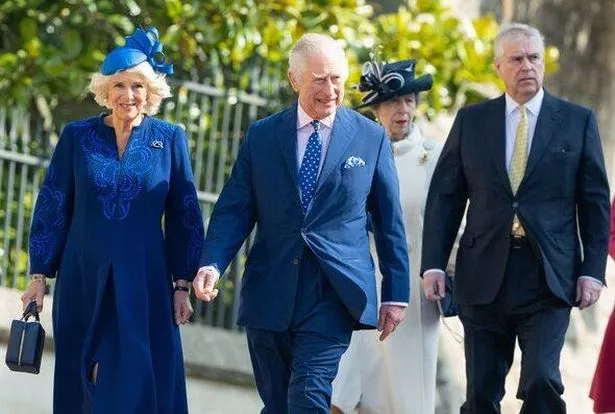In the latest chapter of royal drama, Prince Andrew finds himself at odds with his brother, King Charles III, over a contentious living arrangement.
The Duke of York, who has resided in the lavish Royal Lodge for over twenty years, is refusing to vacate the property, leading to heightened tensions within the royal family.
This ongoing dispute raises questions about Andrew’s future and the implications of his refusal to adapt to the changing landscape of the monarchy.
Royal Lodge, a sprawling estate boasting 30 bedrooms, has been home to Andrew since he signed a 75-year lease in 2003.
However, the situation has become increasingly complicated as King Charles aims to streamline royal responsibilities and assets.
Sources indicate that the King is keen on reducing housing costs, contrasting sharply with Andrew’s insistence on remaining in the luxurious residence.
The backdrop of this feud is rooted in Andrew’s diminished role within the royal family following his withdrawal from public duties in 2019.
This decision came in the wake of serious allegations tied to his association with the late Jeffrey Epstein, a convicted s offender.
Since stepping back, Andrew has faced isolation, and his position within the family has significantly weakened.
Financial strains add another layer to this saga.
Reports suggest that maintaining Royal Lodge, estimated to be worth around $30 million, has become a challenge for Andrew.
While he claims to have secured funding to cover the upkeep, the specifics of these financial arrangements remain unclear.
The King’s decision to cut Andrew’s annual allowance and private security in 2022 likely exacerbated these difficulties.
Royal commentator Rupert Bell highlighted the psychological aspects of this standoff, suggesting that Andrew’s stubbornness stems from a sense of entitlement and a desire to assert his place within the family.
Bell noted that Andrew’s insistence on staying at Royal Lodge might be a way for him to cling to what he feels he has lost, further complicating his relationship with Charles.
As King Charles seeks to modernize the monarchy, the friction between the brothers underscores a broader struggle within the royal family.
Analysts suggest that Charles is focused on ensuring financial sustainability and public respect, which clashes with Andrew’s desire to maintain his former privileges.
This dynamic creates a complex interplay of family loyalty and public expectation.
The ongoing discord has drawn mixed reactions from the public.
Many are critical of Andrew’s refusal to vacate Royal Lodge, seeing it as out of touch with the current expectations of royal conduct.
Meanwhile, Charles appears steadfast in his mission to reshape the monarchy, aiming for a more transparent and responsible institution.
Despite the media spotlight on this feud, Buckingham Palace has remained tight-lipped, adhering to a policy of avoiding public discussions about internal matters.
However, the high-profile nature of the disagreement keeps it firmly in the public eye, raising questions about the future of royals who no longer perform official duties.
As Prince Andrew continues to resist calls for relocation, the implications of this family feud could resonate beyond the immediate issue.
It may influence public perceptions of the monarchy and how extended family members are viewed in terms of their roles and responsibilities.
This situation serves as a reminder of the delicate balance between familial ties and public expectations that the royal family must navigate.
The resolution of this conflict, whenever it may come, will likely provide insights into the future direction of the monarchy under King Charles’s leadership.
As the drama unfolds, the royal family’s internal dynamics are under scrutiny, highlighting the challenges they face in adapting to a rapidly changing world.
How this story develops will undoubtedly shape not only the lives of those involved but also the broader narrative of the British monarchy.
Related Stories

